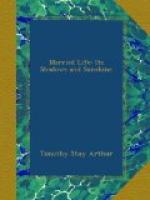All was, of course, reconciled. With tears of joy and contrition Esther acknowledged the error she had committed. Huntley had his own share of blame in his impatient temper, and this he was also ready to confess He did not, however, own that he had thought of deserting his wife on such slight provocation, nor did she confess the fearful suspicion that had crossed her mind.
It was their first and last quarrel.
GUESS WHO IT IS!
“IT will be great deal better for us, Lizzy. America is a country where all things are in full and plenty; but here we are ground down to the earth and half-starved by the rich and great in order that they may become richer and greater. I isn’t so there, Lizzy. Don’t you remember what John McClure wrote home, six months after he crossed the ocean?”
“Yes, I remember all that, Thomas; but John McClure was never a very truthful body at home and I’ve always thought that if we knew every thing, we would find that he wrote with his magnifying glasses on. John, you know, was very apt to see things through magnifying glasses.”
“But the testimony doesn’t come alone from John. We hear it every day and from every quarter, that America is a perfect paradise for the poor, compared to England.”
“I don’t know how that can be, Thomas. They say that it is full of wild beast poisonous serpents, and savage Indians, and that the people are in constant fear of their lives. I’m sure England is a better place than that, even if we do have to work hard and get but little for it.”
“All that used to be, Lizzy,” replied Thomas. “But they’ve killed the wild beasts and serpents, and tamed the savage Indians. And there are great cities there, the same as in England.”
But Lizzy could not be convinced. From her earliest childhood she had never had but one idea of America, and that was as a great wilderness filled with Indians and wild beasts. Of the former, she had heard tales that made her blood curdle in her veins. It was in vain, therefore, for Thomas Ward to argue with his wife about going to America. She was not to be convinced that a waste, howling wilderness was at all comparable with happy old England, even if the poor were “ground down.”
As a dozen previous discussions on the subject had ended, so ended this. Thomas Ward was of the same mind as before, and so was his wife. The one wished to go, and the other to stay.
Ward had only been married a short time, but the period, short as it was, proved long enough to bring a sad disappointment of his worldly hopes. He had been employed as a gentleman’s gardener for many years, and had been able, by strict economy, to lay up a little money. But soon after his, marriage, through some slight misunderstanding he lost his place, and had not since been able to obtain any thing more than transient employment, the return from which had, so far, proved inadequate to the maintenance of himself and wife, requiring him to draw steadily upon the not very large fund that was deposited in the Savings’ Bank.




